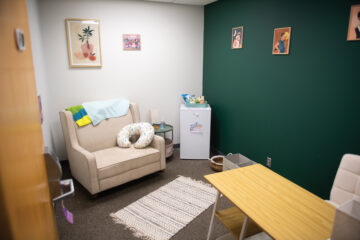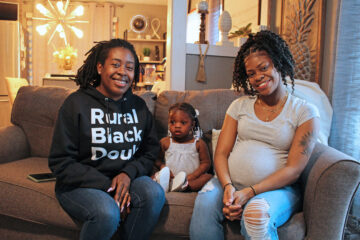The Iowa chapter of Postpartum Support International received funding from the National Institutes of Health that will be used to create postpartum support groups throughout the state in 2024 and beyond.

Advocates said this funding – and the groups it will be used to create – will help not only babies and parents, but also the economy. Untreated perinatal mood and anxiety disorders, also known as PMADs, cost the United States approximately $14 billion annually, or $31,800 per mother-baby pair, according to Brittney Haskins, chair of the Iowa chapter of Postpartum Support International.
“If you’re suffering from mental health issues with no access to medication, therapy or other proven treatment options, you’re more likely to call into work and less likely to attend your baby’s well-child visits, which could result in higher health care costs down the line,” Haskins said.
The NIH funding comes at a critical time for Iowa families, as maternal mortality has continued to rise in Iowa while birthing units, especially in rural areas, have been closing.
The new postpartum support groups will particularly target vulnerable Iowa populations – rural families, NICU families, Black families, refugee families and more, Iowa PSI leaders told Fearless.
The Iowa PSI just finished recruiting postpartum group leaders from throughout the state. These leaders will be paid. Haskins said the leader training will take place in March, with the groups hosting their first meetups in May or June 2024. Each group will receive an annual stipend.
Misconceptions persist about the postpartum period. It’s easy to assume that once a baby is out and healthy, all is well with the mom, too. But more than half of maternal deaths in the United States, 52%, occur after the birth. Suicide is the No. 1 cause of maternal death in the first year postpartum, according to the Iowa chapter of PSI.
There are considerable challenges for new parents today, said Haskins, who was diagnosed with postpartum anxiety six weeks after the birth of her child. That is a big part of what led her to the Iowa chapter of PSI. She started as a board member and has been its chair since October 2022.
Haskins said PSI also provides resources for providers, so that obstetricians and midwives and others can, for example, speak to a perinatal psychiatrist to better understand how to handle a specific patient’s care.
Ashleigh Wiederin, outreach coordinator for St. Anthony Birth Place in Carroll, Iowa, is a board member of the Iowa chapter of PSI and has been leading a postpartum support group in Carroll that will be a blueprint for the new groups.
Wiederin said that she shadowed Haskins for a day when she first started at St. Anthony and that they’ve stayed connected professionally since. St. Anthony used state grant money to focus on postpartum support. That program had broadened since starting out as a breastfeeding support group, she said. The idea was to help foster connections among families who were likely to see one another regularly in their small communities.
“What happened from there was beyond what we even imagined,” Wiederin said. “We started an evening support group because mothers were returning to work and they were like, ‘These are my friends and I want to still be able to see them.’” The program has grown to over 700 visits a year.
Carroll is something of an oasis in a western Iowa obstetrician desert. Women who live as far as 45 miles away might choose to get care there instead of traveling to Des Moines or Omaha. In her day job, Wiederin works with each family on what options might best serve their unique needs, including connecting with a primary care provider closer to home after delivery.
Connection is one of the near-universal needs, of course. But facilitating it is not easy. Challenges rural mothers confront in connecting include transportation access, internet access, and second- and third-shift work hours, Wiederin said.
When challenges can be overcome and a group clicks, she said, the results can be inspiring.
She gave an example of a mother who came to the group with her breast pump she was having trouble operating. Other women surrounded her, leafing through the pamphlet for the pump and searching online.
“That mom wasn’t going to leave without an answer,” Wiederin said.
That sort of camaraderie is something she and PSI hope to replicate in other locations: “I want to be able to be that contact person for those who are starting and saying, ‘OK, here’s maybe something you can try.’”


